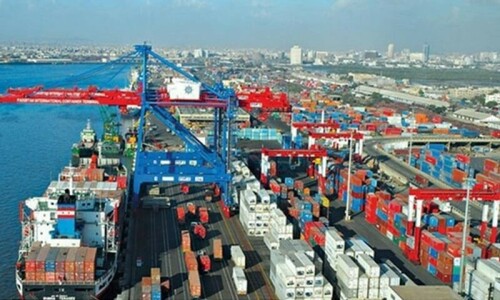THATTA, Nov 13 Sindh's former irrigation secretary Mohammad Idrees Rajput has said that Indus delta is facing an ecological disaster because of non-release of fresh water from the Indus.He was speaking at a seminar on “Water crisis at downstream Kotri understanding social, economic and environmental impacts” organised by the Institute for Research and Education, a network of 14 organisations.
Mr Rajput rejected reports that 35 MAF was going into the sea and said that so much water had never been released into the sea and during the past six years the release had been less than 10 MAF.
He said that mangrove forests, which were crucial to combat climate changes and cyclone threats, need fresh water to survive.
Mr Rajput said that under the 1991 water accord, a study was to be undertaken to determine the water requirement for the delta, but more than 12 years had been wasted on determining terms of reference for the study.
He urged the Sindh government to take the water issue seriously because ecology and the people living in the area were facing threats of a disaster.
Coordinator of the Indus for All Programme-WWF Nasir Ali Panhwar said that the sea intrusion had devastated more than 450,000 acres of farmland in 72 dehs of over eight talukas in Thatta and Badin districts.
Six talukas of Thatta Shah Bandar, Ghorabari, Kharochhan, Mirpur Sakro, Jati and Keti Bandar and two talukas of Badin district Badin and Golarchi were under attack of advancing seawaters.
He said that thousands of people, mainly farmers and fishermen, had left their ancestral places in search of livelihood because of the advance of seawater.
Mr Panhwar said the issue of fresh water release below Kotri barrage had always been handled politically or administratively, although it should have been taken up as an environmental issue, he said.
He said that the Sindh government should constitute a panel of water experts and government and civil society representatives and send them to other provinces to present the case of the delta.
Senior Forester Lala Fazal Balai said that Sindh used to have rich forests which depended heavily on the flow of the Indus.
But due to shortage of water, people depending on forests, fisheries and livestock were facing problems.
He called for water conservation and management and introduction of crops which required less water.
Zahid Jalbani said that 28 of the 42 dehs in Keti Bandar were under seawater.
He said that the area had been famous for red rice which was no more grown there. Adam Gandhro said that 54 settlements of fishermen from Kotri to Keti Bandar had been abandoned.
The condition of the delta had brought people under severe economic pressure.
Abdul Jabbar Bhatti, Mohammad Moosa Keenjhari and Lal Bux Katiyar also spoke at the seminar.












































Dear visitor, the comments section is undergoing an overhaul and will return soon.